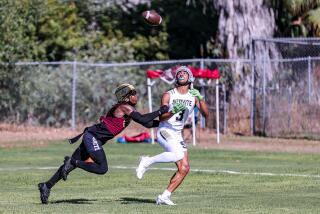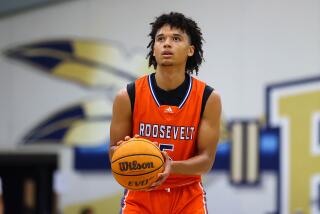L.A. County mock trial competition stirs real emotions
- Share via
Rossana Estrada and her team had trained for three months. They knew the facts of their case. She was certain they had dominated the final round of the Los Angeles County Mock Trial Competition -- an annual event that has become serious business among high school students.
When she heard the winning school’s name announced in a packed courtroom, she burst into tears.
They had lost to Louisville High School.
“You work so hard,” the junior from James Monroe Law and Government Magnet school said, her voice quavering. “You get really excited because it was so close. . . . It just really hurts.”
Sponsored by the Constitutional Rights Foundation, mock trial has become an academic decathlon-type event for the justice-minded student. About 8,000 middle and high school students compete statewide, and 2,000 judges and attorneys volunteer their time. This year, teams from 64 high schools and 36 middle schools competed in Los Angeles County alone.
With an all-senior team, seven county championships and one state title since 1992, Louisville, a Catholic girls’ school in Woodland Hills, is a well-known powerhouse in mock trial competition.
Monroe, a public campus in North Hills, was the underdog with a younger team. The school lost last year in the finals by a painfully small margin to Gabrielino High in San Gabriel, and 2009 was Monroe’s second chance to win.
“They looked very professional, all dressed in black. That was a little intimidating,” said Louisville coach Michael Telesca about Monroe. “Clearly this was a well coached team. They didn’t want to miss a trick.”
Each team prepares both a prosecution and a defense for a fictional case. This year’s involved a stand-up comic accused of strangling an online critic.
The format is designed to teach students about the American justice system by transforming them into amateur attorneys, witnesses and even court bailiffs. Along the way they become confident public speakers and quick thinkers.
A panel of scorers evaluates each student on such criteria as procedural knowledge, familiarity with the case, innovation and polish.
The winner of the high school tournament will have the chance to compete at the state and national level.
Statewide, the prestigious program has run into financial difficulties. About $80,000 in federal funding was eliminated in 2007. The foundation cut costs, relied on grants and dipped into reserves.
Yet for the students, the program’s value continued to grow.
“I think I’ve gained more knowledge about the law than I could have gained anywhere else,” said Monroe senior Rachel Wing.
Wing joined a diverse team. One member knows sign language; both her parents are deaf. Another is a varsity football player. Wing is the daughter of a stand-up comic. But like many teammates, she said she decided to attend the law magnet specifically for programs like mock trial.
Wing won the prize for “outstanding prosecuting attorney,” in part for grace under pressure. At one point, she asked for a time check for her re-direct. Six seconds. Wing had time to ask only one question to prove her witness did not commit the crime.
She stood over her yellow legal pad, on which she’d scribbled the words of her grandfather, an attorney: “Be clear, be brief, be silent.”
Her teammates stared at her. The audience buzzed. What would she do?
“Did you kill Preston Palmer?” she smoothly asked. Her witness denied it. Wing sat down, satisfied.
Judge Ron Rose, who presided over the faux case, burst out laughing.
“I was curious to see what exactly she was going to do with six seconds,” said Rose, who has judged the mock trials for more than 20 years. “I think she performed better than most lawyers would be able to.”
The Los Angeles County Superior Court judge told the panel of scorers that he was glad he didn’t have to choose the winner. It was close: Monroe lost by 0.76 percentage points.
But Rose saw more than heartbreak in the courtroom.
“I know they’re disappointed . . . but they have learned so much.”
More to Read
Sign up for Essential California
The most important California stories and recommendations in your inbox every morning.
You may occasionally receive promotional content from the Los Angeles Times.














